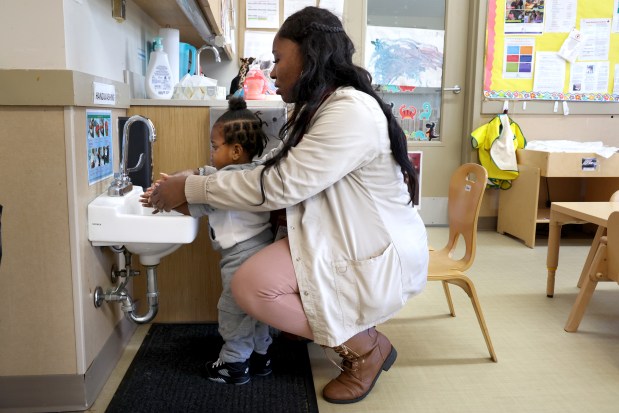Illinois Head Start officials reacted warily Wednesday to assurances from Health Secretary Robert F. Kennedy Jr. that the administration of President Donald Trump supports continued funding for the federal early childhood development program, which supports about 28,000 low-income children and families in Illinois alone.
In testimony before U.S. House and Senate committees, Kennedy on Wednesday recommended that Head Start continue to receive funding in 2026 equal to the previous year. He said the U.S. Department of Health and Human Services will “preserve legacy programs like Medicare, Medicaid and Head Start” and that he’ll “ensure the program (Head Start) continues to serve its 750,000 children and parents effectively.”
But in exchange, he said in written testimony that the program “needs to be consistent with Administration priorities.” These priorities could include “increasing parental choice; improving health, education, and employment outcomes; increasing program delivery efficiency; and promoting parental engagement,” he said.
“For Americans to be healthy, we must start when they are children,” Kennedy said in his written testimony. “Head Start directly supports local-level institutions, including faith-based centers, empowering them to oversee care. Head Start also enables parents to find dignity in work when their children are enrolled in a safe and secure Head Start program.”
Head Start officials feared the program was in trouble after the federal government in early April closed five regional Head Start offices, including one in Chicago, and an internal draft budget document obtained by the Associated Press indicated funding to the program would be cut. But a budget summary released last Friday, which outlined programs lined up for funding cuts, did not include Head Start, the AP reported.
Lauri Morrison-Frichtl, executive director of the Illinois Head Start Association, said Kennedy’s testimony was “good news and I hope there’s continued good news going forward.”
In the meantime, however, the American Civil Liberties Union plans to follow through with a federal lawsuit it filed last month on behalf of Head Start organizations challenging the Trump administration’s efforts to “dismantle” the early childhood program, said Edwin Yohnka, director of communications and public policy for the ACLU of Illinois.
“I think simply saying we’re going to preserve it doesn’t mean you haven’t done damage to the program,” Yohnka said.
Morrison-Frichtl said there are still issues with delayed funding to Illinois Head Start programs due to federal actions such as the U.S. Department of Government Efficiency’s late April “defend to spend” initiative requiring increased justifications for grants from the Department of Health and Human Services.
This initiative is slowing down funding for Illinois Head Start grants, Morrison-Frichtl said. Advocates also are monitoring how the executive order requiring programs to certify removal of DEI initiatives, which the ACLU lawsuit called unconstitutional and overly vague, is affecting the ability for Head Start programs to receive funding, Yohnka and Morrison-Frichtl said
“There’s more and more justification, which we don’t mind doing, but as you can imagine, that is more on the federal end to go through, and it slows that whole process,” Morrison-Frichtl said.
Head Start programs have received federal funding since the preschool effort was started more than 60 years ago as part of President Lyndon B. Johnson’s War on Poverty.
Celina Sarillo, executive director of Start Early, a nonprofit public-private partnership serving over 2,000 children in Chicago, said she supports the federal priorities to “increase parental engagement and improve student outcomes,” but that any funding cut would hurt.
“We think that even just a reduction to that funding means high-quality early childhood programming will not happen for children living in poverty, who are dependent on these programs to get healthy meals every single day, along with all other types of health services related to their physical and mental health,” Sarillo said. “Just one child not being able to access those services is detrimental.”




